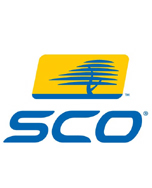 The
SCO Group currently
holds the copyright
to Unix, originally
developed by
AT&T.
The
SCO Group currently
holds the copyright
to Unix, originally
developed by
AT&T.
|
Even after the .com
collapse Linux remains
a formidable challenger
to Microsoft. Having
no central location and
no single point of failure
Linux has made the open
source operating system
seemingly invincible. The
one weak point that Linux
may have is the potential
that some of its code
was, in fact, stolen
from Unix.
The SCO Group, Inc.,
the company that currently
holds the rights to the
proprietary Unix platform,
in 2003 began challenging
several large Linux vendors
including IBM. SCO
claims that entire sections
of code in Linux were
lifted from the source
code of proprietary Unix. Additionally
SCO claims that Linux
source code was developed
using Unix and as result
Linux the property of
SCO.
Microsoft, who stands
to lose the most should
Linux and open source
solutions continue to
rise in popularity, launched
a public relations assault
on Linux coinciding with
the lawsuits. The
software giant claimed
that its products provide
indemnification for its
users but Linux solutions,
which are seemingly less
expensive, can cost much
more in potential liability
as a result of the pending
litigation. According
to Microsoft companies
who use Linux solutions
run the risk of being
liable for damages to
SCO as a result of using
allegedly stolen software. In
a Web site entitled “Get
the Facts on Windows
and Linux,” Microsoft
guarantees intellectual
property indemnification
policy for end-user customers,
something that it says “cannot
be said for Linux and
open source vendors.”
Publicly SCO has denied
that Microsoft is backing
litigation against Linux
vendors and end-users. Recently,
however, Microsoft disclosed
a purchase of $21
million worth of Unix
licenses from SCO. Funds
which the failing SCO
have likely used toward
mounting legal fees. A
representative from SCO,
who refused to be identified
for this report, claims
that the sole reason
for purchase was for
Microsoft’s own
interest in cross-platform
support for Unix in Windows.
“It allows them
to gain greater compatibility
(between) Unix and Windows,” explained
the SCO employee. “Some
of our detractors have
tried to say that it
was designed to try help
us fight our legal case
(against Linux vendors
and users), however nothing
could be further from
the truth.”
The SCO case received
a major blow early in
2004 when an AT&T
newsletter published
in 1985 surfaced (AT&T
developed Unix but since
transferred ownership). The
article laid out the
terms for derivative
works saying that it
wished “to assure
licensees that AT&T
would claim no ownership
in the software that
they developed -- only
the portion of the software
developed by AT&T.”
Open source definition
author Bruce Perens is
so confident that the
SCO suit lacks merit
that he sits on the board
of directors for Open
Source Risk Management,
a company that insures
corporations against
liability.
“My opinion is
that the entire SCO case
is a deliberate act of
intellectual property
fraud,” said Perens. “(SCO)
understands perfectly
well that they do not
have any rights regarding
the software they assert
rights to.”
Additionally SCO has
challenged corporate
Linux users. AutoZone
and DaimlerChrysler are
among the group that
SCO claims is infringing
on its copyright through
deployment of Linux solutions
within the corporations.
The debate is still
on about whether the
SCO suits have had a
negative effect on Linux
sales. Reports
show Linux numbers steadily
climbing while SCO’s
stock hovers under $4.00
per share, recovering
from an all-time low
of $2.76 less than a
year ago. |



































